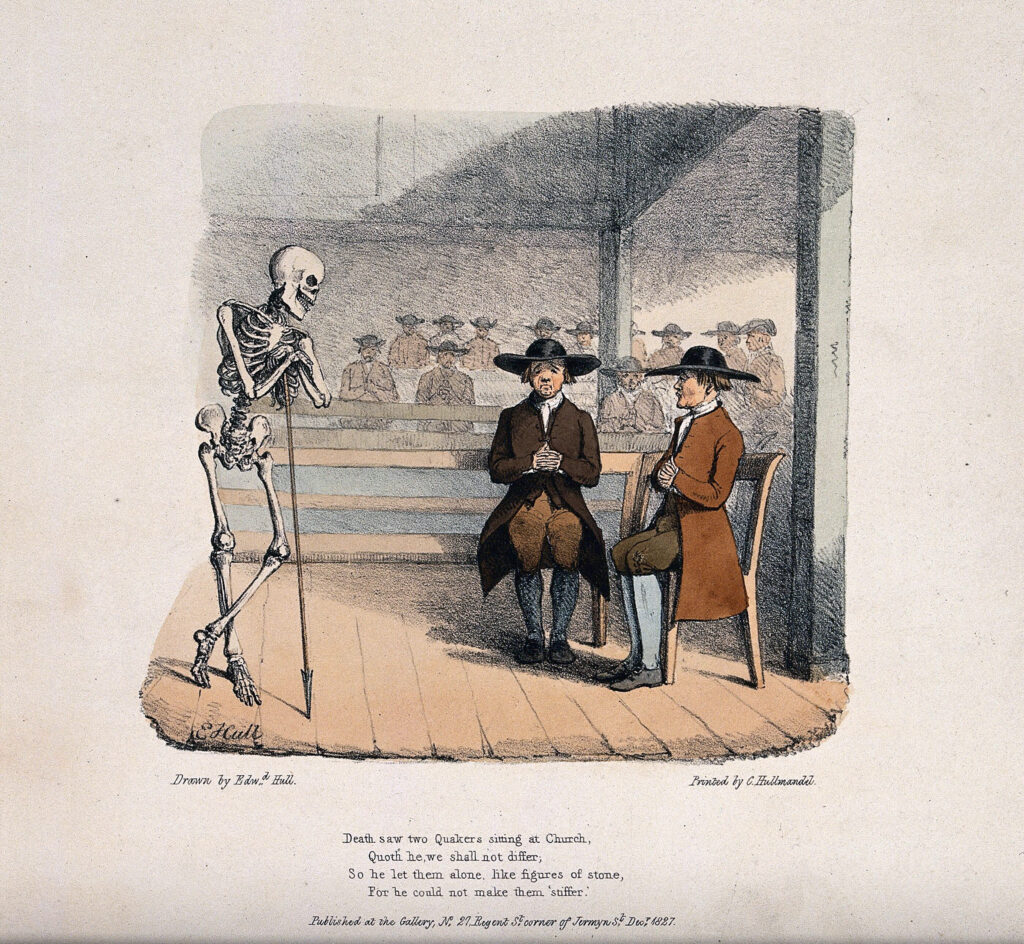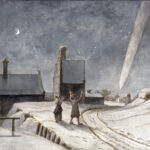31 October 1684: Mrs Taylor of Brighouse, a Quaker, is buried upright next to her husband and daughter in their garden

“Death saw two Quakers sitting at church, / Quoth he, we shall not differ; / So he let them alone, like figures of stone, / For he could not make them ‘stiffer.'” (Hull 1827/12).
Oliver Heywood. 1881. The Rev. Oliver Heywood, B.A., 1630-1702, Vol. 2. Ed. J. Horsfall Turner. Brighouse: A.B. Bayes. Get it:
.Unedited excerpt
If an excerpt is used in the book, it will be shorter, edited and, where applicable, translated.
Captain Taylor of Brighouse his wife died Oct. 28, 1684, buried on Oct. 31, in their garden with their head upward, standing upright, by her husband, daughter etc. being Quakers, aged 60.
Comment
Comment
Heywood also notes the death and curious burial (standing or sitting?) of her husband six months before: “Capt Th Taylor: buried on his own backside Apr. 30. 1684, a Quaker, but a rich man, aged 63.” Is this true or is Heywood trolling a rival sect? Gwynne Stock says that there is no evidence for the meme that Quakers were buried standing up (Stock 2012), and, though in the end you save horizontal space, having to dig to as much as 12/13 feet instead of 6/7 strikes me as a challenge. How tough is the sandstone at Brighouse? Have local archaeologists looked for the Taylors?
Thomas Taylor is an interesting figure:
Thomas Taylor, of Brighouse (c. 1621-1684) was formerly, we understand, one of Cromwell’s Ironside Captains, but changed his profession of carnal to spiritual warfare, and cast in his lot with the then despised Quaker community, as early as 1654 (Green 1909).
Green then points to George Fox, who encounters this particular Thomas Taylor on several occasions, here in 1654:
Then I went to Thomas Taylor’s within three miles of Halifax, where was a meeting of about two hundred people; amongst which were many rude persons, and diverse butchers, who had bound themselves with an oath before they came out, that they would kill me (as I was told): one of those butchers had been accused for killing a man and a woman. They came in a very rude manner, and made a great disturbance in the meeting, which being in a close, Thomas Taylor stood up and said to them, “If you will be civil, you may stay; but if not, I charge you to be gone from off my ground.” But they grew worse, and said they would make it like a common; and they yelled and made a noise as if they had been at a bear-beating. They thrust friends up and down, who being peaceable, the Lord’s power came over them. Several times they pushed me off from the place I stood on, by the crowding of the people together against me; but still I was moved of the Lord to stand up again as I was thrust down. At last I was moved of the Lord to say to them, “If they would discourse of the things of God, let them come up to me one by one; and if they had anything to object, I would answer them all, one after another;” but they were all silent, and had nothing to say: and then the Lord’s power came so over them all, and answered the divine witness in them, that they were bound by the power of God, and a glorious powerful meeting we had, and the minds of the people were turned by the holy Spirit in them to God, and to Christ their teacher. The powerful word of life was largely declared that day, and in the life and power of God we broke up our meeting; and that rude company went their way to Halifax. The people asked them, “Why they did not kill me, according to the oath they had sworn?” They maliciously answered, “I had so bewitched them they could not do it.” Thus was the devil chained at that time. Friends told me, they used to come at other times and be very rude, and sometimes break their seats and make frightful work amongst them; but the Lord’s power had now bound them. Shortly after this butcher, that had been accused of killing a man and a woman before, and who was one of those that had bound himself by an oath to kill me, killed another man, and was thereupon sent to York gaol. Another of those rude butchers, who had also sworn to kill me, having accustomed himself to thrust his tongue out of his mouth in derision of friends when they passed by him, had his tongue so swollen out of his mouth that he could never draw it in again, but died so. Several strange and sudden judgments came upon many of these conspirators against me, which would be too large to declare here. God’s vengeance from heaven came upon the blood-thirsty, who sought after blood; for all such spirits I laid before the Lord, and left him to deal with them, who is stronger than all, in whose power I was preserved and carried on to do his work. The Lord hath raised a fine people in those parts, whom he hath drawn to Christ, and gathered in his name; who feel Christ amongst them, and fit under his teaching (Fox 1765).
Heywood (op. cit.) again re their son in January 1690: “Thomas Taylor of Brighouse … hath been a ranter, kept gentlemen’s company, owes 1000li, his goods were seized and now a selling to pay creditors.”
Perhaps Major Peter Labilliere, “eccentric resident of Dorking,” was an Antipodean Quaker:
Taking a moment to think about Major Peter Labelliere, who will forever be known to posterity as ‘an eccentric resident of Dorking’. pic.twitter.com/UmWpqDjUxi
— Jonathan Healey (@SocialHistoryOx) March 17, 2022
Something to say? Get in touch
Similar
 11 December 1680: The Great Comet is seen in Halifax as a natural event, in London – amid Popish Plot hysteria – as a portent
11 December 1680: The Great Comet is seen in Halifax as a natural event, in London – amid Popish Plot hysteria – as a portent
Comment
Comment
Something to say? Get in touch
Search
Donate
Music & books
Place-People-Play: Childcare (and the Kazookestra) on the Headingley/Weetwood borders next to Meanwood Park.
Music from and about Yorkshire by Leeds's Singing Organ-Grinder.


 Bluesky
Bluesky Extwitter
Extwitter